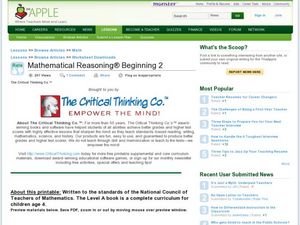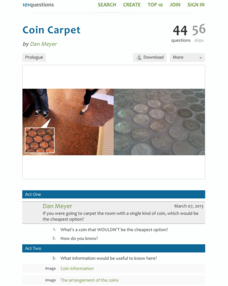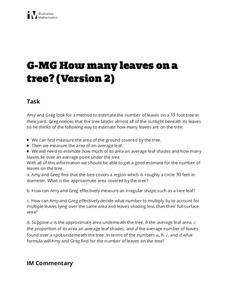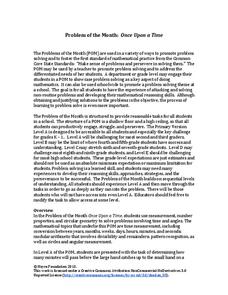Curated OER
Critical Thinking Problems
Young mathematicians practice their reasoning as well as adding and subtracting skills with this worksheet that includes five simple word problems about birthdays. Learners are give pictures of birthday cakes and based on the number of...
Education Development Center
Word Problem with Rational Numbers—Balancing Bars of Soap
Here's a resource teachers won't want to wash their hands of. Given a task where a full bar of soap is on one side of a balance and 3/4 of a bar of soup and a 3/4-ounce weight is on the other side, young mathematicians must determine the...
101 Questions
Coin Carpet
Here's a new meaning to the expression throwing away money...a carpet of coins! An intriguing lesson requires calculations to determine the coin that would be the cheapest option, but it's a little tricky. The cost of the coin...
Inside Mathematics
Two Solutions
Many problems in life have more than one possible solution, and the same is true for advanced mathematics. Scholars solve seven problems that all have at least two solutions. Then three higher-level thinking questions challenge them to...
Illustrative Mathematics
Running Around a Track II
On your mark, get set, GO! The class sprints toward the conclusions in a race analysis activity. The staggered start of the 400-m foot race is taken apart in detail, and then learners step back and develop some overall race strategy...
Illustrative Mathematics
How Many Leaves on a Tree? (Version 2)
A second attack at figuring out the number of leaves on a tree, this activity makes both an excellent follow-up to version 1 and a stand-alone activity. Learners practice setting parameters and deciding acceptable estimate precision, and...
Balanced Assessment
Fractured Subtraction
Can you spare a 10? Scholars determine digits that could complete a two-digit subtraction problem. They must find all possible combinations of digits and provide an explanation for their reasoning.
EngageNY
Choice of Unit
Explore using units with scientific notation to communicate numbers effectively. Individuals choose appropriate units to express numbers in a real-life situation. In this 13th lesson plan of 15, participants convert numbers in scientific...
Howard Hughes Medical Institute
Population Dynamics
Will human population growth always be exponential, or will we find a limiting factor we can't avoid? Young scientists learn about both exponential and logistic growth models in various animal populations. They use case studies to...
Noyce Foundation
Once Upon a Time
Examine the relationship between time and geometry. A series of five lessons provides a grade-appropriate problem from elementary through high school. Each problem asks learners to compare the movement of the hands on a clock to an angle...
Benjamin Franklin High School
Saxon Math: Algebra 2 (Section 1)
This first of twelve algebra 2 resources provides a broad review of many algebra 1 concepts through a number of separable lessons and labs. Starting with the real number system and its subsystems, the sections quickly but thoroughly...
Curated OER
Teaching Students Mathematical Reasoning Skills
Students can build upon their basic math skills and become higher order thinkers when we encourage the following principles.
Achieve
Rabbit Food
Keep your pets slim, trim, and healthy using mathematics! Pupils use a linear programming model to optimize the amount and type of food to provide to a pet rabbit. They model constraints by graphing inequalities and use them to analyze a...
Concord Consortium
Circumscribed Polygon
Trigonometry teachers often go off on a tangent, and here's a worksheet that proves it! First, young mathematicians use a formula with tangent to prove a formula correct for area. Then, they draw conclusions about the area of a circle...
Curated OER
Algebra: What's My Rule?
Students apply higher level thinking skills to determine rules for sorting and classification. In this pre-algebra lesson, students nominate classmates who they think satisfy the unspoken "rule" established by the leader. As students are...
Oddrobo Software
King of Math Junior
Do your students have what it takes to be the king of math? Find out with this fun skills practice game that covers a wide range of topics from counting and basic operations to measurement and fractions.
Willow Tree
Line Graphs
Some data just doesn't follow a straight path. Learners use line graphs to represent data that changes over time. They use the graphs to analyze the data and make conclusions.
EngageNY
Dividing by (x – a) and (x + a)
Patterns in math emerge from seemingly random places. Learners explore the patterns for factoring the sum and differences of perfect roots. Analyzing these patterns helps young mathematicians develop the polynomial identities.
Concord Consortium
Defining Logarithms
An inverse relationship exists between exponents and logarithms, allowing mathematicians to easily convert one to the other. Scholars apply a brief definition of logarithms with a few practice problems. Then, they discover the...
Mathematics Assessment Project
Middle School Mathematics Test 5
A middle school test contains two 40-minute sections covering material through algebra. All questions involve applied problem solving or mathematical analysis.
Mathematics Assessment Project
Middle School Mathematics Test 6
A thorough math test divides the content into two 40-minutes sections, covering material through algebra and geometry. Problems incorporate analysis and applied problem solving.
Noyce Foundation
Cubism
If cubism were a religion, would you follow it? Lower-level tasks focus primarily on counting the number cubes in a structure and relating the number to surface area. As learners progress to higher-level tasks, isometric drawings and...
5280 Math
Integer Interpreter
Can you add variables if you don't know their value? Using an empty number line, scholars first locate the position of the difference, sum, product, and quotient of two unknown integers. Later problems mix operations as well as add...
5280 Math
More or Less the Same
Tell the story of the math. Given a graph of a linear system, learners write a story that models the graph before crafting the corresponding functions. Graphs intersect at an estimated point, allowing for different variations in the...























